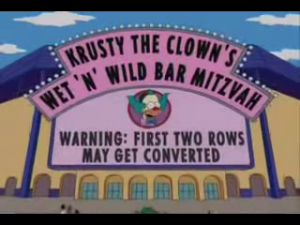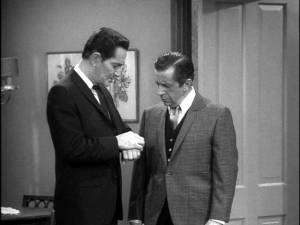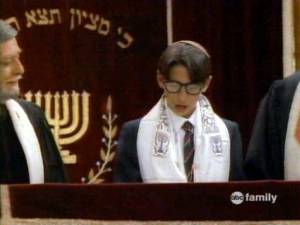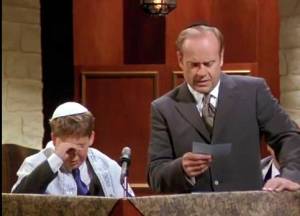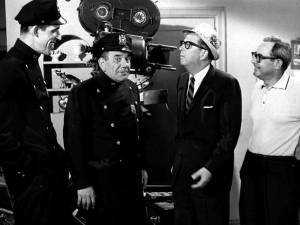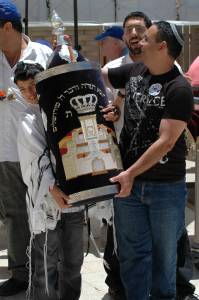
Photo © 2010 Matthew Wilkinson CC BY-ND 2.0
Click here for original image.
This morning, I napped while my daughters attended their bat mitzvah lessons. I’ve been exhausted after watching just about every bar-mitzvah themed TV episode ever produced (though some of them at 4x speed, just because the shows themselves were so stupid). Nonetheless, this exercise has revealed to me one important fact: the bar mitzvah is the only ethnic ceremony in the universe not depicted in Star Trek.
Now, television, over the years, has become much more relaxed about the bnot mitzvah. Culminating in the recent “Karen does her first bar mitzvah” episode of Smash. (Which reminds me, I need to make sure everyone who’s coming to my girls’ bnot mitzvah knows the words to “Hava Nagila” so they sing it.)
One of my favorite TV-watching activities is to figure out the inaccuracies and inconsistencies, especially as it applies to real-life culture. Here are some notable bar-mitzvah episodes:
The Simpsons, season 15 episode 6, “Today I Am a Clown”:
Krusty discovers he has no star on the Jewish Walk of Fame, because he never had a bar mitzvah. So he throws the biggest bar-mitzvah bash since— Oh, never mind. It’s as tacky as hell.
Besides which, no, a Jew doesn’t actually need to have a bar-mitzvah ceremony in order to be counted as a Jew. In fact, a Jew doesn’t even have to have a bar mitzvah in order to come of age. All children become responsible for their own choices at the appropriate age, regardless of whether they have a public ceremony.
The Dick van Dyke Show, season 5 episode 22, “Buddy Sorrell, Man and Boy”:
Buddy is acting strangely, leading Dick and Sally to believe that he’s having an affair with his rabbi’s wife. (Oy vey!) In reality, he’s taking bar-mitzvah lessons, because he never had a bar-mitzvah ceremony when he was a boy, because his family was too poor.
I don’t know about being too poor to afford a bar mitzvah. I’ve seen even very poor families, with the help of the synagogue community, pull together a minimal celebration. Not every coming-of-age needs to be a production on the scale of Krusty’s.
Interesting that the rabbi is giving him bar mitzvah lessons. Isn’t there anyone else in the synagogue who can help with that? (Our tiny synagogue has at least a half-dozen.) Doesn’t the rabbi have enough else to do?
But the best gag: “Barechu es Hashem hamevorach. Hey, I think I’ve got it!” Yeah, the first line. Now what about the rest of it?
The Wonder Years, season 2 episode 13, “Birthday Boy”:
Kevin is upset that his best friend Paul’s bar mitzvah is scheduled for the same day as his own birthday party. Apparently, Kevin’s 13th birthday just happens to fall on the first Saturday after Paul’s.
Okay, now… Dinner at Paul’s house… Chicken and scalloped potatoes, Gracie? I’m sure they’re both very good. But is that kosher? Must be a soy chicken… or soy potatoes.
Actually, a bar mitzvah doesn’t actually have to occur on the first Sabbath after a boy turns 13. In fact, as in the Dick van Dyke episode, it’s possible for a person to grow old before going through the actual ceremony. In our synagogue, we schedule the bat mitzvah months ahead of time, for a convenient Sabbath when we can dedicate the entire Torah service and drashah to the bar mitzvah.
Nonetheless, this bar mitzvah supposedly occurs on Saturday, March 18, 1969… except that March 18, 1969 happened to fall on a Tuesday. (Oops.) The part of the Torah that Paul chants is from Deuteronomy 25:17-19, which is a special “maftir” passage that is read on the Sabbath before Purim… which fell on March 1, 1969 (the Sabbath before Purim 1969). So Paul seriously lucks out and gets do to a wicked short Maf and Haf… only 3 verses long. (I bet my kids are both envying him.)
This is actually a great episode, which highlight our need for status, that we need to achieve and to have those achievements recognized. That’s not to say that one’s identity needs to come from an ethnic heritage. But it is to say that we need to be something, and our sense of identity and sense of community helps define who we are.
Frasier, season 10 episode 6, “Star Mitzvah”:
Please, no cellphones or flash photography during Shabbat shacharit. (I should probably remind all my guests of that.)
Frasier’s son Freddie has his bar mitzvah (because his mother is Jewish). Frasier wants to deliver his speech in Hebrew, so he asks Noel to help him out. Unfortunately, he pissed Noel off, and Noel taught him the speech in Klingon instead. (Sheesh! Klingon doesn’t even sound like Hebrew.)
As I remarked in an earlier post, I am still composing my daughters’ bnot mitzvah speech. I do not plan to deliver it in Klingon.
More interesting: The thing that Frederick chanted… The first part of it I know comes from the birkat hamazon, which is never said in synagogue. The last line comes from the third blessing of the Amidah, which the bar mitzvah would never lead in that way. But that line also pops up in Car 54, Where Are You? (below), which confuses me, because I’ve never heard these two parts said at a bar mitzvah or bat mitzvah like that. But it might just be our custom (our minhag), the details of which sometimes varies between synagogues.
Car 54, Where Are You?, season 2 episode 24, “See You at the Bar Mitzvah”:
Finally, a classic TV show from before there were classic TV shows, Car 54, Where Are You?, starring Herman Munster and his father-in-law, with some really great makeup—They look almost normal!
When they hear that no one is going to show up at Joel Pokrass’s bar mitzvah, because his father is a despicable absentee landlord who apparently owns most of the city, Officer Toody and Muldoon spring into action to try to scare up—I mean, scrape together—a crowd for the boy.
A cute story, but to refuse to attend synagogue for a boy’s bar mitzvah, just because his father is unlikeable…. Oy vey! That so does not reflect good Jewish values. (Also does not reflect good Christian values, either, which the Christians inherited from the Jews.) Apparently, Rabbi Solomon has a bigger problem than he lets on.
And on one more serious note: There’s one scene where the rabbi resorts to his last-ditch, desperation tactic, which he loathes to do, but he has no other choice. He calls the local parish Catholic Priest, who also does not want to help. I wonder if that was just a cheesy joke, or whether it reflected the reality of the early 60’s. And to what extent does modern reality reflect the increased ecumenicalism between Judaism and Christianity we see in Gilmore Girls, in which Rabbi Barans and Reverend Skinner even share the same building.
Food for thought.
-TimK
